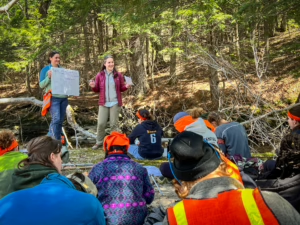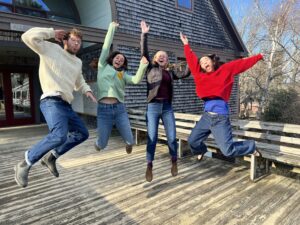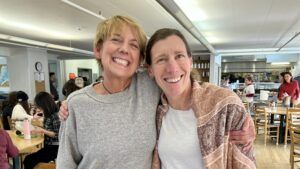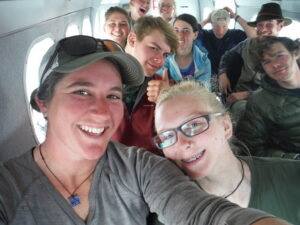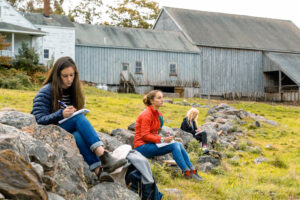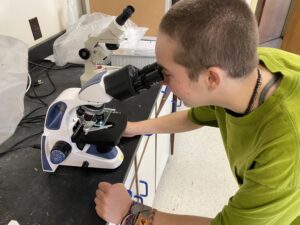Maine students have always been an important part of Maine Coast Semester; they work hard, have a deep knowledge of Maine’s history and culture, and don’t get nervous about a little mud or snow. Semester cohorts often look to their Maine peers for guidance and leadership. Maine students, in turn, gain an entirely new perspective of their home state. Many are inspired to work towards a more sustainable future on the local and state level, passing on the transformative growth they’ve experienced at Chewonki to other communities.
To acknowledge the importance of Maine students, Maine Coast Semester recently launched a new scholarship: the Maine Youth Environmental Leaders Scholarship. It’s our first ever merit-based award designed to recognize high-achieving Maine sophomores who have demonstrated an appreciation for the natural world and imagine a future creating positive change in their Maine community.
Our first two inaugural scholars, Ruby Peterman from Baxter Academy of Science and Technology in Portland, Maine, and Inez Furth of Washington Academy in East Machias, Maine, were part of Maine Coast Semester 63 in the fall. Read on to learn more about Ruby’s and Inez’s experiences at Chewonki, and then check out our scholarship page to learn more about becoming a scholar yourself! The deadline for sophomores to apply is February 17, 2020.
Is there a place on Chewonki Neck where you feel most at home?
Inez: I can recall countless spots on Chewonki Neck where my heart is at home, but there is one place, in particular, I will always have a special connection to. This place is my solo spot at Red Pines, a place where I was able to better connect with my surroundings and myself. There is such power in being alone. Waking up by myself looking out over the golden marsh bathed in sunlight I remember feeling completely centered. I will always love my home by the marsh.
Ruby: The Point was assigned to me for phenology [phenology is the study of cyclic and seasonal natural phenomena, especially in relation to climate and plant and animal life. Semester students are assigned a location to practice phenology throughout their time on the neck]. Every time I went back to The Point, I found some new and fascinating shells or creatures basking in the golden light, and it became a great example of how a small portion of land is filled with so much discovery.
Ruby: The Point was assigned to me for phenology. [Phenology is the study of cyclic and seasonal natural phenomena, especially in relation to climate and plant and animal life. Students are assigned a location on Chewonki Neck where they practice phenology throughout their time here.] Every time I went back to the Point, I found some new and fascinating shell or creature basking in the golden light, and it became a great example of how a small portion of land is filled with so much discovery.
How are the academics at Maine Coast Semester different from academics at your high school?
Inez: My Environmental Issues class was completely transformative. I learned so much from that class. It helped me build the skills to better understand how we should look at and approach some of the challenges our Earth faces today. Not only did I learn how to ask the important questions, have engaging conversations, and discuss hard topics, but I was also introduced to brilliant authors who I continue to learn from. This class helped me grow as a person and a thinker, and I am so grateful.
Ruby: Natural History was especially exciting to me because it gave me a deeper understanding of Maine’s ecosystems and inhabitants. Environmental Issues was also very thought-provoking. I was introduced to important concepts and information that are crucial to my understanding of the ecological crisis we are facing today.
What was the biggest change you saw in yourself when you finished Maine Coast Semester?
Inez: My ability to better articulate thoughts and to observe and understand my surroundings. Ultimately these skills have helped me to better understand myself.
Ruby: How I experience and view the world around me—nothing is one-sided and understanding the intricacy of everything is extremely important. This can apply to natural science, ethics, climate action, art and so much more.
What advice would you give to other students thinking about applying to the Maine Youth Environmental Leaders Scholarship?
Inez: I would say DO IT–apply! I know applying can sometimes be intimidating, but trust me, it’s worth it. Plus, I think you can make writing fun, and you can learn a lot by answering and thinking about the questions/prompts. I hope you apply!!
Ruby: Think carefully about what you want out of Maine Coast Semester when you’re applying. I came out of the experience with a greater understanding of myself and my relationship to the environment. The scholarship’s goal is to give students a chance to further their education around the natural world and to become future leaders. Hone in on why you want to attend Maine Coast Semester and where you want that experience to take you.
More Information about the Maine Youth Environmental Leaders Scholarship
Sophomores: Apply to Maine Coast Semester by February 17th, 2020!


